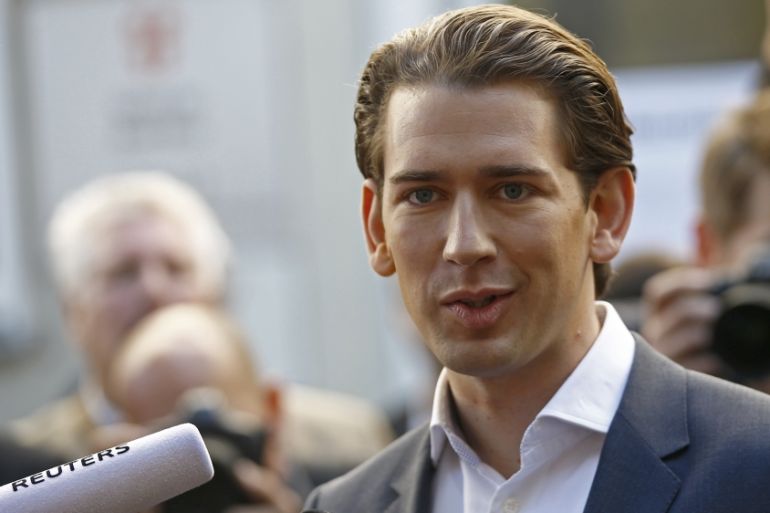Austria elections: Sebastian Kurz’s OVP ‘leads’ vote

The conservative People’s Party (OVP), led by 31-year-old Sebastian Kurz, is projected to finish first in Austria‘s snap parliamentary election, according to exit polls that suggest a clear shift to the right.
A projection by pollster SORA showed centre-right OVP winning Sunday’s election with 31.6 percent of the vote, based on a count of all non-postal ballots. Kurz’s party, however, is far short of a majority and will need to form a coalition.
Keep reading
list of 4 itemsBehind India’s Manipur conflict: A tale of drugs, armed groups and politics
Solomon Islands prepares for ‘most important election since independence’
Six takeaways from first day of Trump’s New York hush money criminal trial
The centre-left Social Democratic Party (SPO) was on 26.9 percent, just ahead of the far-right Freedom Party (FPO) on 26.0 percent.
The projection had a margin of error of 0.7 percentage points, meaning the race for second place was too close to call. Another projection by pollster ARGE Wahlen had the SPO just 0.5 percentage points ahead of the FPO.
|
|
Speaking after the announcement of the initial exit polls, Kurz said he will fight for a new style of politics in Austria.
“Today the voters, men and women in this country, gave us a great mandate,” he told supporters.
“We must be aware of this opportunity, the women and men are putting their hopes into this movement. We will use all of our strength and all of our fight to bring about change in this country,” added Kurz, who will become Europe’s youngest government leader if he manages to form a coalition cabinet.
“There is much to do to establish a new style, a new culture of politics in this country.”
During campaigning, Kurz did not rule out a coalition with the FPO, which adopted anti-immigrant and anti-Muslim rhetoric.
On Sunday, he repeatedly declined to say which option he favoured, adding that he wanted to await the count of postal ballots that will settle the race for second place.
The bulk of those ballots, which are roughly a sixth of those cast, will be counted on Monday.
“Let’s give it a couple of days. Then we will see what the result really looks like,” Kurz told broadcaster ORF when pressed on what he plans to do. He also said he planned to talk to all parties in parliament and did not rule out forming a minority government.
For his part, FPO leader Heinz-Christian Strache said the projected result showed that his far-right party had “arrived at the centre of society”.
He added: “We are the ones that dominate the political debate.”
![Joyous OVP supporters in Vienna react to the first exit polls [Dominic Ebenbichler/Reuters]](/wp-content/uploads/2017/10/5bba793349fd4d36a224953752d764ef_18.jpeg)
Shift to right
Austria’s election arrived almost a year earlier than expected, following a breakdown of an OVP-SPO coalition government in May.
Kurz, named OVP leader in May, pledged to shake up Austrian politics, which for decades has been dominated by coalitions between his party and SPO.
He built his popularity by adopting many of the FPO’s mantras, making this an election defined by issues raised by the far right, such as stricter immigration and the role of Islam in Austrian society.
READ MORE: Everything you need to know about Austria’s elections
“What dominated the headlines [ahead of the election] was the attempt to try and change the way that Muslims have been integrated into society here,” said Al Jazeera’s David Chater, reporting from the OVP headquarters in Austria’s capital, Vienna.
“It does seem that this debate has been controlled by the centre right and the far right,” he added.
A continued co-operation between Kurz’s OVP and Chancellor Christian Kern’s SPO looked increasingly unlikely, given the outcome and the deep rifts between the two centrist parties that led to the breakdown of their coalition in May.
“It seems pretty clear, if the polls are correct, that we will have a coalition between OVP and FPO reshaped under Kurz, controlling the government in parliament, and that would really change Austria’s politics,” said Chater.
